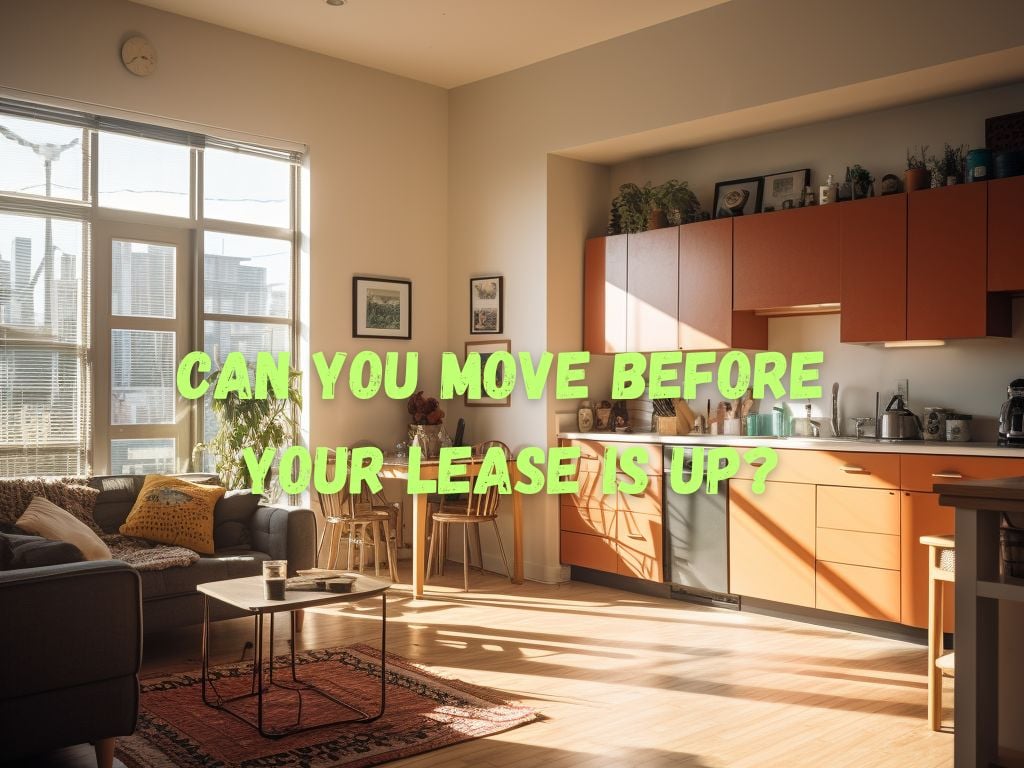Moving before the end of a lease term can be a complex process, but sometimes it becomes necessary.
That’s why it becomes important to know whether you can move before your lease is up especially in 2023 and beyond.
This article aims to guide you through the process of moving out before your lease is up, helping you understand the legal considerations, potential consequences, and pro tips to smooth the transition.
Understanding Your Lease Agreement
Before making any decisions regarding moving before your lease ends, it’s crucial to thoroughly understand your lease agreement.
Here are the key aspects to consider:
Terms and conditions: Familiarize yourself with the specific terms and conditions outlined in your lease agreement, including the lease duration, notice period, and any penalties for early termination.
Move-out clause: Check if your lease agreement includes a move-out clause that outlines the steps and requirements for terminating the lease prematurely.
Understanding this clause will provide clarity on what you need to do to move out legally.

Breaking Your Lease Agreement
Breaking a lease agreement is a serious matter and can have legal and financial consequences.
Consider the following factors if you find yourself in a situation where breaking your lease is necessary:
Consequences of breaking a lease: Understand the potential repercussions, such as financial penalties, loss of security deposit, negative impact on credit score, and even legal action by the landlord.
Options for breaking a lease: Explore alternative options such as subletting, lease assignment, or negotiating with your landlord for early termination. Each option has its own considerations and potential limitations.
Negotiating with your landlord: If breaking the lease is unavoidable, consider discussing the situation with your landlord in a respectful and open manner. They may be willing to work out a mutually beneficial solution that minimizes the negative impact on both parties.
Can You Move Before Your Lease Is Up?
Technically you can move before your lease is up, but doing that requires careful planning and adherence to certain procedures. To navigate this process successfully, consider the following subtopics and important points:
Giving Notice to Your Landlord
One crucial step in moving out before your lease is up is giving proper notice to your landlord. Check your lease agreement for the required notice period and follow it precisely.
Here are some key points to remember:
Review your lease agreement: Familiarize yourself with the specific notice requirements stated in your lease. It may specify the form of notice (written notice, email, etc.) and the time frame (30 days, 60 days, etc.) for providing notice.
Provide written notice: Regardless of the notice method allowed, it’s always recommended to provide written notice to your landlord. This ensures there is clear documentation of your intent to terminate the lease.
Include important details: The written notice should include the date, your name, the property address, and the anticipated move-out date. Be concise and professional in your communication.

Paying Rent Until the End of the Lease Term
Most lease agreements require tenants to continue paying rent until the lease term expires, even if they move out early.
Here’s what you should know about rent payment:
Understanding your financial obligations: Despite moving out, you remain responsible for paying rent until the lease term concludes. Failing to fulfill this obligation could result in legal consequences or damage your rental history.
Consider potential financial implications: Moving out early means you may have to simultaneously cover rent for your current property and the future rental expenses for your new place.
Ensure you have the financial means to meet these obligations.
Discuss options with your landlord: In some cases, landlords may be willing to negotiate a mutually agreeable arrangement, such as allowing early termination upon finding a new tenant.
Communication with your landlord might open alternative possibilities.
Cleaning and Repairing the Rental Unit
Before moving out, you should leave the rental unit in good condition to maximize the chances of receiving your security deposit back.
Follow these guidelines:
Thorough cleaning: Clean the entire unit, including floors, walls, appliances, and fixtures. Pay special attention to areas that accumulate dirt or grime. If possible, hire professional cleaners for a comprehensive and pristine clean.
Repair any damages: Assess the condition of the property and address any damages you are responsible for. This may include fixing holes in walls, replacing damaged items, or repairing any wear and tear that exceeds normal usage.
Document the property’s condition: Take photos or videos documenting the condition of the rental unit before you leave.
This serves as evidence of the property’s condition upon your departure and can support any claims about your responsibility for damages.
Return the keys: Ensure that all keys and access devices are returned to the landlord or their designated representative as per your lease agreement. This helps finalize the termination process.
By following these steps and meeting your obligations, you can minimize potential disputes and maintain positive relationships with your landlord.
Pro Tips
Read and understand your lease agreement before signing it: Take the time to carefully review the lease agreement, seeking clarification on any unclear terms or conditions.
Communicate with your landlord if you need to move out before your lease is up: Open and respectful communication with your landlord can increase the chances of finding a mutually beneficial solution.
Keep a record of all communication with your landlord: Document all conversations, emails, and written agreements with your landlord to protect yourself in case of any disputes or misunderstandings.

Frequently Asked Questions
Can I break my lease agreement if I have a valid reason?
Tenants may be allowed to break a lease agreement under certain circumstances, such as job relocation, medical emergencies, or domestic violence. Consult local laws and seek legal advice to understand your rights and options.
Can I sublet my rental unit if I need to move out before my lease is up?
Subletting can be a viable option if your lease agreement permits it. Make sure to follow proper procedures and obtain the landlord’s consent before subletting the property.
What happens if I move out before my lease is up without giving notice to my landlord?
Moving out without giving proper notice may result in financial penalties and damage to your rental history. It’s essential to follow the terms of your lease agreement to avoid potential legal consequences.
Conclusion
Moving out before your lease is up is a decision that should not be taken lightly.
Understanding your lease agreement, exploring options for breaking the lease, and following the necessary steps when moving out can help minimize potential legal and financial issues.
By staying informed and proactive, you can navigate the process with confidence and ensure a smooth transition to your new home.


 Tags:
Tags:










